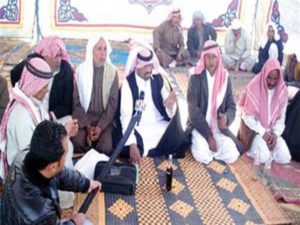Customary councils “ Magales Urfi”
Customary law is a set of socially accepted and inherited rules and practices. It is a stractural law that defines the methods of behavior and the rules that are imposed on those who deviate from it. It derives its strength from some religious sources, as well as the values, standards, customs and traditions inherited through generations, while continuing to be flexible to mange with the social changes, for example replacing the inkind penalties ( camels ) to cash. The Bedouin inherited it since a thousand Bedouin lives, carrying out what he is commanded for fear of being punished by a custom based on custom. The folklore (in customs, traditions, stories, songs, songs, proverbs, etc.) has formulated many aspects that reflect the requirements of custom, especially those related to marriage, kinship and neighborhood relations, and the elements of the life cycle…etc. There are customary governing councils that resolve disputes and determine punishment for violating customary rules. Those implementing customary law rules differ from region to region. In North Sinai and the Eastern Desert, this matter is handled by a number of sheikhs of tibes and opinion-holders « awakel ». As for the Awlad Ali tribes in the Western Desert, it is made up of “wise people and propitiats, overseers.” The terminology applied to this judicial body varies according to the different geographical regions. In the Eastern Desert (Ababda and Bashariya tribes) and Western Desert (Awlad Ali) they use the term “Promise”, while in North Sinai they use the term “Urfi Council”. In urban areas, he is the head of the family, and everyone is subject to his ruling.. and if they do not come down to his ruling.. there are social penalties which are applicable to the accused and his family or clan. In coustmary councils there are specialized judiciary ; a judge form murder crimes, judge for stealing or women’s assault, harassment or rape..etc. In Upper Egypt these councils are responsible for resolving retaliatory disputes between families away from formal law procedures. The main function of customary law is to implement social control in traditional societies.




